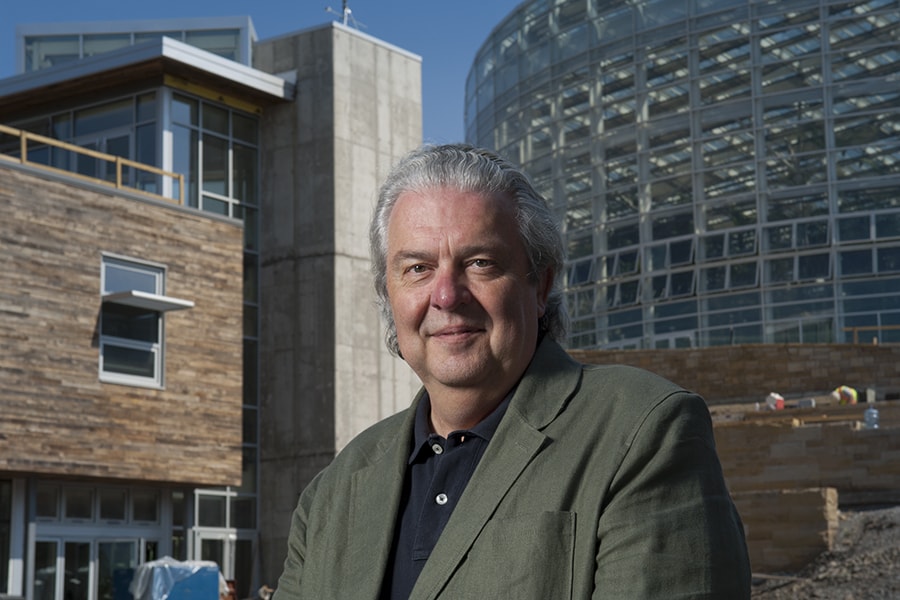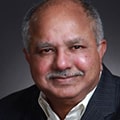
Personal Mention
Stephen Lee, professor and head of the School of Architecture, has been named one of the Top 25 Most Admired Educators in Architecture, Interiors, and Landscape Architecture in the 2019 DesignIntelligence survey. The rankings, conducted annually by DesignIntelligence on behalf of the Design Futures Council, survey the design industry to compile rankings for architecture schools across the United States. Lee’s activities focus on issues of systems integration, material innovation, renewable energy, and the integrated design process for high performance commercial and residential architecture. He is a LEED accredited professional and provides sustainable design consulting services for institutional and commercial clients in Europe, Asia, Canada and the United States. His teaching activities have resulted in the integration of undergraduate courses related to design, environment, materials, structures and construction.

 Lenore Blum, Distinguished Career Professor of Computer Science, and Raj Reddy, University Professor of Computer Science and Robotics, will be keynote speakers at the Computing in the 21st Century Conference, Nov. 6-7, in Beijing. The conference is Microsoft Research Asia’s largest annual event and this year will mark MSRA’s 20th anniversary. Blum’s address will focus on her work with husband Manuel and son Avrim on developing a computer architecture that could enable conscious artificial intelligence – machines that truly experience feelings, rather than simulate them. Reddy will review the tools, techniques and advances of AI over the past half century, separating hype from reality, and will discuss two types of intelligent agents – one that will help people work faster and more efficiently and another that helps people do tasks previously impossible for humans. Harry Shum, a Robotics Institute alumnus who is executive vice president of Microsoft’s AI and Research Group, and Peter Lee, former head of the Computer Science Department and now corporate vice president of Microsoft Research, also will be keynote speakers.
Lenore Blum, Distinguished Career Professor of Computer Science, and Raj Reddy, University Professor of Computer Science and Robotics, will be keynote speakers at the Computing in the 21st Century Conference, Nov. 6-7, in Beijing. The conference is Microsoft Research Asia’s largest annual event and this year will mark MSRA’s 20th anniversary. Blum’s address will focus on her work with husband Manuel and son Avrim on developing a computer architecture that could enable conscious artificial intelligence – machines that truly experience feelings, rather than simulate them. Reddy will review the tools, techniques and advances of AI over the past half century, separating hype from reality, and will discuss two types of intelligent agents – one that will help people work faster and more efficiently and another that helps people do tasks previously impossible for humans. Harry Shum, a Robotics Institute alumnus who is executive vice president of Microsoft’s AI and Research Group, and Peter Lee, former head of the Computer Science Department and now corporate vice president of Microsoft Research, also will be keynote speakers.
 Dena Haritos Tsamitis has secured a $5 million award from the National Science Foundation for CMU's CyberCorps Scholarship for Service (SFS) program through 2023. The SFS@CMU program provides students a full-tuition scholarship and a generous stipend for living expenses in exchange for government service in a cybersecurity role after graduation. "Carnegie Mellon is a leader in cybersecurity education and research, and this funding enables the university to leverage its unmatched capabilities and capacity to strengthen the federal corps of cybersecurity personnel," said Haritos Tsamitis, the Barbara Lazarus Professor in Information Networking and director of the Information Networking Institute. "Our programs attract, educate and develop cybersecurity experts well-positioned to defend our nation and tackle the challenges faced by government agencies." Find out more.
Dena Haritos Tsamitis has secured a $5 million award from the National Science Foundation for CMU's CyberCorps Scholarship for Service (SFS) program through 2023. The SFS@CMU program provides students a full-tuition scholarship and a generous stipend for living expenses in exchange for government service in a cybersecurity role after graduation. "Carnegie Mellon is a leader in cybersecurity education and research, and this funding enables the university to leverage its unmatched capabilities and capacity to strengthen the federal corps of cybersecurity personnel," said Haritos Tsamitis, the Barbara Lazarus Professor in Information Networking and director of the Information Networking Institute. "Our programs attract, educate and develop cybersecurity experts well-positioned to defend our nation and tackle the challenges faced by government agencies." Find out more.
 Physics Professor Randall Feenstra has been awarded the 2019 Davisson-Germer Prize in Atomic or Surface Physics from the American Physical Society. The award recognizes Feenstra’s distinguished career in surface science, particularly his “pioneering developments of the techniques and concepts of spectroscopic scanning tunneling microscopy.” A scanning tunneling microscope (STM) images surfaces at the atomic level. Unlike an optical microscope that provides a direct image of an object, the STM uses a stylus and electric current to scan the surface and record each atom. The STM was invented at IBM Zürich by Gerd Binnig and Heinrich Rohrer in 1981; they received the Nobel Prize in Physics for their work in 1986. Feenstra has received numerous awards for his work, including the Alexander Von Humboldt Foundation Research Award, the Peter Mark Memorial Award of the American Vacuum Society and the IBM Outstanding Innovation Award. He is a fellow of the American Physical Society and the American Vacuum Society. Feenstra has published more than 230 papers in peer-reviewed journals and contributed seven book chapters, which have been cited more than 10,000 times. Find out more.
Physics Professor Randall Feenstra has been awarded the 2019 Davisson-Germer Prize in Atomic or Surface Physics from the American Physical Society. The award recognizes Feenstra’s distinguished career in surface science, particularly his “pioneering developments of the techniques and concepts of spectroscopic scanning tunneling microscopy.” A scanning tunneling microscope (STM) images surfaces at the atomic level. Unlike an optical microscope that provides a direct image of an object, the STM uses a stylus and electric current to scan the surface and record each atom. The STM was invented at IBM Zürich by Gerd Binnig and Heinrich Rohrer in 1981; they received the Nobel Prize in Physics for their work in 1986. Feenstra has received numerous awards for his work, including the Alexander Von Humboldt Foundation Research Award, the Peter Mark Memorial Award of the American Vacuum Society and the IBM Outstanding Innovation Award. He is a fellow of the American Physical Society and the American Vacuum Society. Feenstra has published more than 230 papers in peer-reviewed journals and contributed seven book chapters, which have been cited more than 10,000 times. Find out more.
 Keenan Crane, assistant professor of computer science and robotics, has been named one of 18 recipients of a 2018 Packard Fellowship for Science and Engineering. The fellowship from the David and Lucile Packard Foundation recognizes innovative early-career researchers and includes $875,000 to aid in each fellow’s research for five years. Crane’s research explores how the shapes and motions observed in nature can be faithfully expressed in a language that is completely finite and discrete, and hence be understood by a computer. His exploration of this question provides both new foundations for computation, as well as new ways to turn digital designs into physical, shape-shifting matter. At CMU, his work has included computational tools for translating complex 3D designs into mechanisms that can be built by cutting, bending, inflating, or milling physical material, as well as fundamental algorithms for understanding geometric data. Crane joined the CMU faculty in 2015. He earned a Ph.D. in computer science at Caltech and previously had an NSF Mathematical Sciences Post-Doctoral Fellowship at Columbia University’s Department of Computer Science.
Keenan Crane, assistant professor of computer science and robotics, has been named one of 18 recipients of a 2018 Packard Fellowship for Science and Engineering. The fellowship from the David and Lucile Packard Foundation recognizes innovative early-career researchers and includes $875,000 to aid in each fellow’s research for five years. Crane’s research explores how the shapes and motions observed in nature can be faithfully expressed in a language that is completely finite and discrete, and hence be understood by a computer. His exploration of this question provides both new foundations for computation, as well as new ways to turn digital designs into physical, shape-shifting matter. At CMU, his work has included computational tools for translating complex 3D designs into mechanisms that can be built by cutting, bending, inflating, or milling physical material, as well as fundamental algorithms for understanding geometric data. Crane joined the CMU faculty in 2015. He earned a Ph.D. in computer science at Caltech and previously had an NSF Mathematical Sciences Post-Doctoral Fellowship at Columbia University’s Department of Computer Science.
